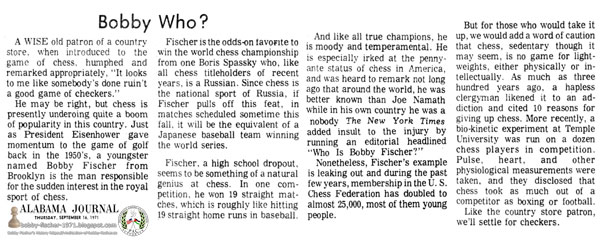Alabama Journal Montgomery, Alabama Thursday, September 16, 1971 - Page 4
Bobby Who?
A WISE old patron of a country store, when introduced to the game of chess, humphed and remarked appropriately, “It looks to me like somebody's done ruin't a good game of checkers.”
He may be right, but chess is presently undergoing quite a boom of popularity in this country. Just as President Eisenhower gave momentum to the game of golf back in the 1950's, a youngster named Bobby Fischer from Brooklyn is the man responsible for the sudden interest in the royal sport of chess.
Fischer is the odds-on favorite to win the world chess championship from one Boris Spassky who, like all chess titleholders of recent years, is a Russian. Since chess is the national sport of Russia, if Fischer pulls off this feat, in matches scheduled sometime this fall, it will be the equivalent of a Japanese baseball team winning the world series.
Fischer, a high school dropout, seems to be something of a natural genius at chess. In one competition, he won 19 straight matches, which is roughly like hitting 19 straight home runs in baseball.
And like all true champions, he is moody and temperamental. He is especially irked at the penny-ante status of chess in America, and was heard to remark not long ago that around the world, he was better known than Joe Namath while in his own country he was a nobody The New York Times added insult to injury by running an editorial headlined “Who Is Bobby Fischer?”
Nonetheless, Fischer's example is leaking out and during the past few years, membership in the U.S. Chess Federation has doubled to almost 25,000, most of them young people.
But for those who would take it up, we would add a word of caution that chess, sedentary though it may seem, is no game for lightweights, either physically or intellectually. As much as three hundred years ago, a hapless clergy likened it to an addiction and cited 10 reasons for giving up chess. More recently, a bio-kinetic experiment at Temple University was run on a dozen chess players in competition. Pulse, heart, and other physiological measurements were taken, and they disclosed that chess took as much out of a competitor as boxing or football.
Like the country store patron, we'll settle for checkers.























